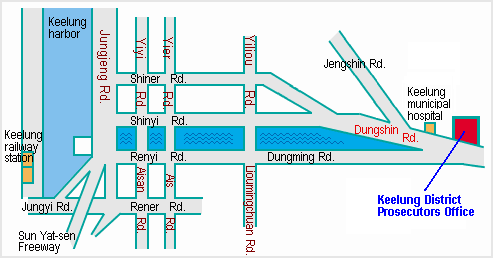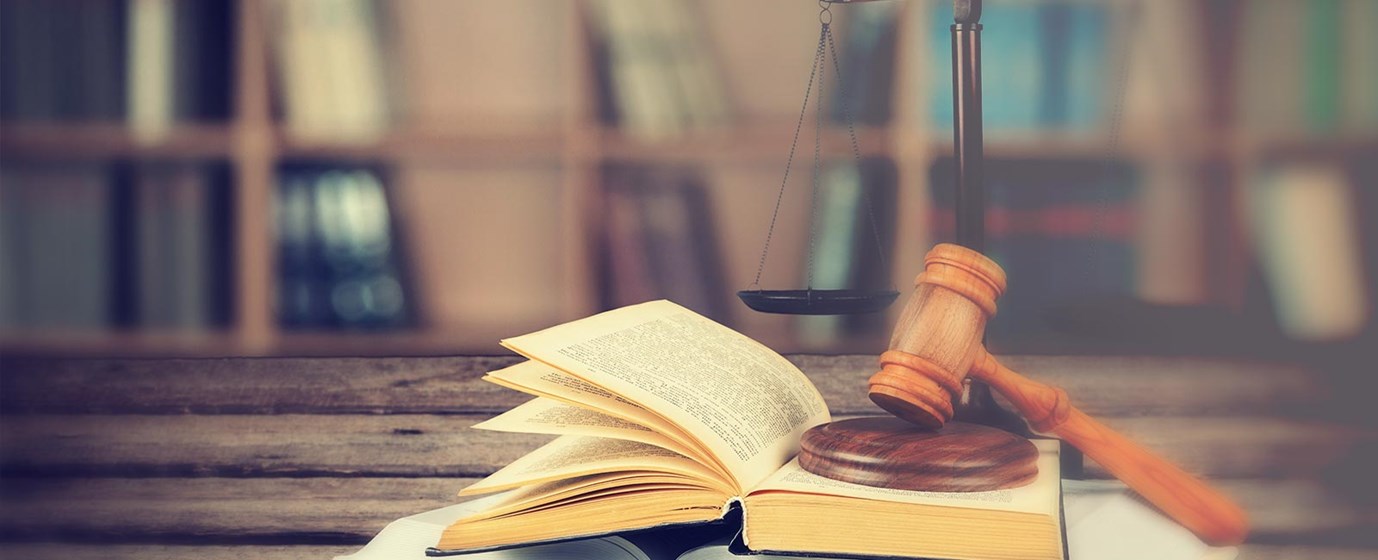- 2024.10.21 Keelung Prosecutors Office, in U.S.-Taiwan Collaboration, Intercepts Smuggled Standardized Firearms; Five Defendants Indicted in Trafficking Ring
- 2025.5.29 Bringing Dragon Boat Festival Cheer: After-Care and Probation Services Share the Aroma of Zongzi
- 2025.2.5 Community Service from Keelung Prosecutors Office Assists Elderly Living Alone in Home Cleanup, Delivering Warmth and Humane in the Judicial System
- 2025.4.15 Enhancing Legal Awareness and Strengthening Understanding of Property, Drunk Driving, and Violent Crimes
- 2024.10.28 U.S.-Taiwan Joint Operation Thwarts Trafficking of Service Firearms into Taiwan: Keelung District Prosecutors Indict Five Men, including Hsieh, the Prime Suspect in the Firearms Trafficking Scheme.
Location
-

Location、Map
Map of the Taiwan Keelung District Prosecutors Office *Apart from the plaza in front of the Main Building, a temporary parking lot has also been arranged on Chongfa Street by this Office for public access. *Due to the limited space and insufficient parking capacity, we kindly advise visitors to utilize the Liuhe Parking Lot, which is located within a 10-minute walking distance from this Office, in order to avoid parking difficulties. Public Transportation GuideBus Stop Name: District Court (Dongxin Road) Keelung City Bus:Route 201 (Shenme Elementary School Line),Route 202 (Shenme Elementary School Line),Route 203 (Shen'aokeng Line)《Bus stops for these routes are available near Keelung Train Station. 》 Keelung Intercity Bus:Route 788 (Keelung – Jinguashi)《Bus stops for these routes are available near Keelung Train Station. 》 Metropolitan Intercity Bus:Route 2088 (Badouzi – Taipei City Hall Bus Station), Route 2088 (Keelung Girls' Senior High School – Taipei City Hall Bus Station) Driving Directions: Take the exit to the Coastal Highway from National Freeway No. 1, turn right onto Ren 1st Road, then continue onto Dongming Road. Follow the road straight to arrive at the entrance of this Office. Address: No. 178, Dongxin Rd., Xinyi Dist., Keelung City 201206Tel: (02) 2465-1171
Functions
-
District Prosecutors Office
The major functions of a District Prosecutors Office are to pursue crimes and direct the execution of penal sentences aimed at maintaining the law and order in the society and at protecting people’s lives, bodies, freedoms, and property. The functions describing above have to be accomplished by every single prosecutor. Hence the responsibilities of any other member of our staff are to assist the prosecutor to fulfill the functions of our District Prosecutors Office. According Article 60 of the Organic Law, the functions of a prosecutor should include making investigations, initiating indictment, making public indictments, assisting with voluntary prosecutions, taking over voluntary prosecutions, directing the execution of a criminal judgment, and carrying out the execution prescribed by other laws. 1. Making investigations, and initiating indictment When a prosecutor is aware of law-offending cases from a legal complaint, accusation, self-confession, and other reasons that a person is suspected of having committed a crime, he shall immediately initiate an investigation procedure. (Paragraph 1 of Article 228 of the Code of Criminal Procedure) The prosecutor, who is the principal in an investigation, may direct the judicial police (officers) to proceed with the investigation of a criminal case. (Articles 229 through 231 of the Code of Criminal Procedure) If necessary, he may, or in response to a request from the judicial police (officers), issue a communications surveillance warrant and appeal to the judge for issuing a search warrant and for detaining a defendant. This will ensure the completeness of evidence gathering, execution of duty by judicial police strictly according to law, and exact protection of human rights. After the investigation, if the prosecutor believes that the evidence is sufficient to the suspect, he shall have the offender indicted. (Paragraph 1 of Article 251 of the Code of Criminal Procedure) 2. Making public indictments, assisting with voluntary prosecutions, and taking over voluntary prosecutions After an indictment, the court shall summon the defendant or his attorney, if any, to appear on the day of trial, and also notify the prosecutor, the attorney, and the assistant to fulfill their duties at the trial court. (Article 271 of the Code of Criminal Procedures) In the court, the prosecutor shall state the essential reasons for the indictment and present the evidence. He shall also appeal the court to impose a penalty on the offender. If a judgment is made against the law or otherwise improper, the prosecutor shall appeal the judgment to the court of appeal (Taiwan High Court). This is intended to oversee the judgment by a court, to prevent misjudgment, and to protect human rights. When a victim makes a voluntary indictment, the prosecutor may appear on the trial day to state his opinions (Article 330 of the Code of Criminal Procedures), called “assisted voluntary indictment.” If the initiator of the voluntary indictment has lost his ability of action or deceased before the closure of the debate, the court shall consider the situation to pass a judgment, or to inform the prosecutor to take over the voluntary indictment. 3. Directing the execution of a criminal judgment According to the Paragraph 1 of Article 457 and Article 458 of the Code of Criminal Procedures, the prosecutor has the responsibility to issue a written order of directing the enforcement of criminal decision made by the court. 4. Carrying out the execution prescribed by other laws The prosecutors shall be in charge of when the public interests involve in civil or other administrative affairs required by laws summarized below: a. Civil affairs Requesting the court for a declaration of the death of a missing person or its cancellation. Requesting the court for a declaration of civil incompetence or its cancellation. Requesting the court for dissolution of an unlawful corporate body. Requesting the court for selection of liquidator of a corporate body. Requesting the court for assignment of will executor. Requesting the court for change the organization of a corporate body. Requesting the court for invalidity of acts taken by the director of a corporate body. Requesting the court for selection of a temporary administrator when the directors of a corporate body are incapable to discharge their duties. Requesting the court for selection of inheritance custodian. b. Dealing with victim compensation. c. Dealing with compensation for the wrong detention and execution. d. Directing over matters relating to conciliation by village, town or county conciliation commission. e. Protection for crime victims. The Association for Protection of Victims of Criminal Laws, Keelung Branch was established to provide monetary assistance and legal counseling and to comfort the families of the killed and severely injured. A group of volunteers assists the association to help crime victims. (Article14, Crime Victims Protection Law)
Primary Goals
-
Goals
The first important job of the prosecutors office is to prosecute crimes and to conduct the execution of criminal judgement, so as to enhance investigation and attack on corruption, to eliminate organized crimes, to conduct investigation on drugs strictly, to prevent against smuggling, to inspect and eliminate burglary, to investigate crimes on damage to ecology of the national land, to investigate election bribery thoroughly, to investigate felony rapidly, to prevent children and juveniles from sexual transaction, to investigate crimes related to intelligent property rights, to crack cases on economic and computer crimes etc. The purpose is to clarify government administrations, to purify election style, to solidify democracy political foundation. Thus, our citizens will be free from the harm by drugs and crimes, and will enjoy the safety of life, freedom and properties. Furthermore, we also focus on the enforcement of parole and probation and regeneration of adult criminals on the one hand so that the criminals who committed crimes unintentionally could be relocated. Moreover, we value the protection of victims on the other hand so that the victims and/or their family could obtain compensation from the government.











